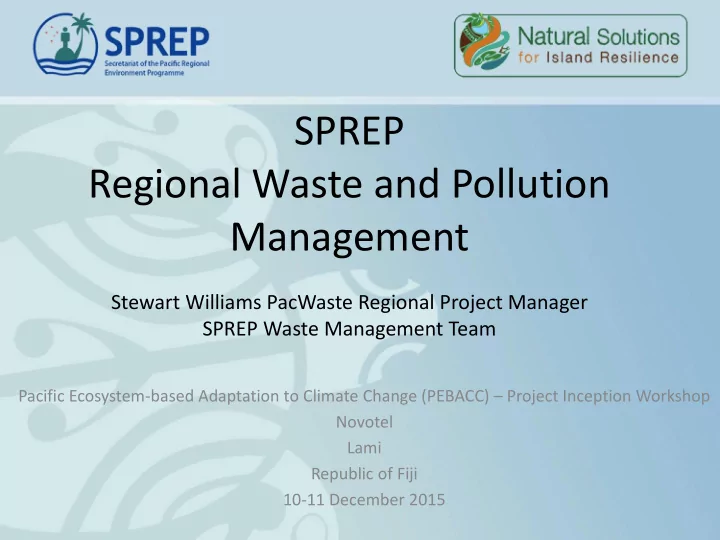

SPREP Regional Waste and Pollution Management Stewart Williams PacWaste Regional Project Manager SPREP Waste Management Team Pacific Ecosystem-based Adaptation to Climate Change (PEBACC) – Project Inception Workshop Novotel Lami Republic of Fiji 10-11 December 2015
Presentation Aims • Introduce the SPREP Waste Management Division • Summarize key waste management priorities and projects in the Pacific region • Identify potential areas of collaboration between waste management and PEBACC
SPREP Structure Climate Biodiversity & Environmental Waste & Corporate Change Ecosystems Monitoring Pollution Services Marine and Coastal & Adaptation Monitoring Land Outreach Marine Pollution Hazardous Threatened Information Mitigation Governance Species & IT Waste Science & Invasive Planning Solid Waste Finance Policy Species Biodiversity HR
Marine Pollution • Marine oil and waste management • Ships Waste Management • Port Waste Management • Invasive Marine Species including ballast water • Marine litter management
Hazardous Waste Management Integrated waste management includes hazardous waste • Asbestos • E-Waste (electronic wastes) • Chlorinated organics • Insecticides and herbicides • Heavy Metals • Waste oil • Medical wastes • ODS Gases
Solid Waste Management Both regional and national strategies with a priority on 3Rs and return: a. Separation of wastes b. Backyard composting of vegetable and food scraps c. Recycling of glass, plastic, aluminium and paper d. Improved collection and disposal systems e. Improved financial mechanisms Waste mass is minimised and collection costs reduced
Major Regional Waste Projects (SPREP/JPRISM) Regional Waste Focus Budget Countries Timelines projects (USD) PacWaste Hazardous Wastes 9 Million 15 2013-2017 (SPREP/EU) Integrated Solid Waste Management Regional Information Exchange GEFPAS UPOPS Solid Waste 3 Million 14 2014-2018 (SPREP) Hazardous Waste Training JPRISM Solid Waste 10 Million 11 2012-2016 (JICA) Landfill Improvements (inc. Fukuoka Method) Capacity Building AFD Waste Oil Collection & 1.4 Million 4 2013-2017 (SPREP) Management
PEBACC Collaboration Areas Target critical ‘waste’ stressors to the ecosystems: a.Landfill leachate from dumpsites b.Pollutants from open burning of waste c.Chemical impacts from dumped batteries, e-waste and pesticide containers a.Litter/pollution impacts - ineffective collection, containment & recycling
PEBACC Collaboration Areas Potential Areas: a. Cost effective collection systems introduced b. Diversion of waste from landfill/large scale green waste composting initiated c. Improved landfilling techniques/elimination of waste burning commenced d. Recycling of batteries, aluminium improved e. Education at all levels
Component JICA/JPRISM PacWaste GEFPAS SPREP JPRISM2? EDF 11? (EU/SPREP) (UPOPS) (2017-2021) (2017-2021) Improved Solomons Lessons learnt Regional Solomons Solomon’s landfilling/treatment Vanuatu Kiribati ?Vanuatu ? ?Vanuatu ? techniques Fiji Fiji? Fiji? Green waste diversion Lessons learnt Regional Solomon’s Solomon’s from landfill/composting RMI Pilot ?Vanuatu ? ?Vanuatu ? Fiji? Fiji? Collection or recyclables Solomons Solomon’s (Lead acid Vanuatu batteries/aluminum cans Fiji etc) Improvements to the Lessons learnt Solomon’s Solomon’s waste collection systems RMI Pilot ?Vanuatu ? ?Vanuatu ? Fiji? Fiji? Waste water Solomon’s Solomon’s improvements ?Vanuatu ? ?Vanuatu ? Fiji? Fiji?
THANKS FOR LISTENING! SPREP Waste Management and Pollution Control Team, Apia, Samoa wasteteam@sprep.org
Recommend
More recommend